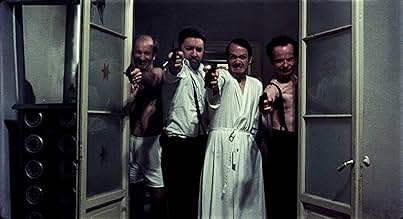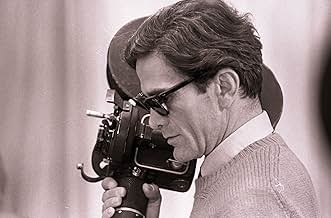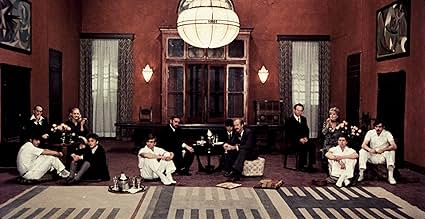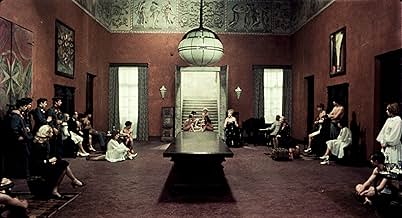
Reproduzir clip3:12
Assistir a If You Liked Terrifier 3, Watchlist These Endurance Horror Classics
Durante a Segunda Guerra Mundial na Itália, quatro fascistas encurralaram nove adolescentes e os submeteram a cento e vinte dias de torturas.Durante a Segunda Guerra Mundial na Itália, quatro fascistas encurralaram nove adolescentes e os submeteram a cento e vinte dias de torturas.Durante a Segunda Guerra Mundial na Itália, quatro fascistas encurralaram nove adolescentes e os submeteram a cento e vinte dias de torturas.
- Direção
- Roteiristas
- Artistas
- Prêmios
- 2 vitórias no total
Uberto Paolo Quintavalle
- Eccellenza
- (as Umberto P. Quintavalle)
Hélène Surgère
- Signora Vaccari
- (as Helene Surgere)
Resumo
Reviewers say 'Salò, or the 120 Days of Sodom' is a controversial film exploring power, corruption, and depravity. Based on de Sade's work, it depicts extreme abuse by fascists. Many find it disturbing yet artistically significant, while others criticize its graphic content and slow pace. Its examination of fascism and power abuse is noted, sparking debates on its artistic and moral value.
Avaliações em destaque
Pier Paolo Pasolini, as is well known, was murdered not long after he finished work on this, his most audacious and confrontational film, yet even the most casual viewing of SALO begs the question - had he not been murdered, would he have taken his own life anyway? Every sequence, every shot and practically every moment of this film is so burdened with despair, barely concealed rage and a towering disgust with the human race, one gets the impression that Pasolini was barely hanging onto life - and any attendant shreds of hope - by his fingernails. Although ostensibly an adaptation of one of DeSade's most depraved works channeled through the horrifying excesses of the Second World War with the Fascist ruling classes as its (authentically vile) villains, SALO also contains a lot of contemporary criticism - Pasolini hated the modern world, and explained the stomach-churning 'banquet of s**t' as a none-too-subtle attack on the encroaching global domination of the fast food chains. (The scenes of sexual excess can similarly be read as a despairing attack on the permissive society - those who come to SALO expecting titillation or B-movie sleaze will be sorely disappointed.) Beyond the nihilistic content, which has been well documented elsewhere, the film has an overall mood that seems to have been engineered to make the viewer thoroughly depressed. Shot on washed-out, faded film stock using primarily static cameras, long shots, choppy editing and very few cutaways, SALO has a visual style reminiscent of cinema-verite documentary. Add to this the unnerving use of big band music, piano dirges and the (intentionally?) scrappy post-dubbed dialogue, and the distancing effect on the viewer is complete. SALO comes across as one long primal scream of rage, designed to shake the viewer out of his complacency, and in this respect, the film succeeds unequivocally. Whether or not you would care to watch this more than once, or indeed for 'entertainment', is another matter, but SALO is an important film that demands a careful viewing ONLY by those prepared for it.
This is on the list of most disturbing movies ever. But it's not disturbing for the sake of it. There is an underlying exposition of a fascist government and it's ability to control to the most depraved extremes. I don't need to go into the plot, just don't watch if your skin crawls easily.
Apparently based loosely on the Marquis de Sade's eponymous story, it feels dirty...it feels icky. You will not finish the film feeling happy, relieved, redeemed, or satisfied. You will feel that humanity is capable of terrible things and sometimes for no real reason other than they can. It shows what happens when people blindly follow terrible people and abandoned their own sense of decency. The following orders defense will never work. When you've become an accomplice you ate equally guilty.
This movie has depth, but it's not an easy watch. It's not for a simple eve with a date. I can't imagine watching this with anyone other than fellow film students or a significant other you've been with for years.
Apparently based loosely on the Marquis de Sade's eponymous story, it feels dirty...it feels icky. You will not finish the film feeling happy, relieved, redeemed, or satisfied. You will feel that humanity is capable of terrible things and sometimes for no real reason other than they can. It shows what happens when people blindly follow terrible people and abandoned their own sense of decency. The following orders defense will never work. When you've become an accomplice you ate equally guilty.
This movie has depth, but it's not an easy watch. It's not for a simple eve with a date. I can't imagine watching this with anyone other than fellow film students or a significant other you've been with for years.
Speak the name in some circles and you'll be greeted with cries of derision and condemnation. In others, you'll be told it's one of the most important, powerful films ever made. There may be no movie so infamous or so hotly contested as Pier Paolo Pasolini's last film 'Salò, or the 120 Days of Sodom.'
Inspired by 'The 120 Days of Sodom, or the School of Libertinage' by the Marquis de Sade, the film is set in Italy during WWII and follows four fascists named The Duke, The Magistrate, The President and The Bishop. Alongside their barbaric troupe of acolytes, they put a group of eighteen children through a Dantesque cycle of torture and perversion.
Completely unremitting in its' depiction of depravity and offering the viewer no respite from scenes of brutality at any point during its' runtime, the film makes for a fascinatingly violent viewing experience that is uncomfortable and unforgettable.
It may be easier to start discussing the definitive positive elements of the movie. The cinematography and shot construction is undeniably beautiful and artistic. The images on screen are strange, perverse and off-putting, but captured with style and skill behind the camera- a credit to the work of cinematographer Tonino Delli Colli. The stirring soundtrack makes effective use of pieces by Chopin, Bach and others, while Ennio Morricone's original score is haunting.
The film also benefits from having a cast full of dedicated, brave performers, whose work lingers in the mind long after the film has ended. The actors playing the four fascist libertines are all outlandishly, disgustingly terrific, with Giorgio Cataldi and Aldo Valetti being particularly memorable as The Bishop and The President respectively. As one of their accomplices, Hélène Surgère also does admirable work, but it's hard to appreciate the performances when the characters are so detestable and despicable and the actions they perform so thoroughly base.
This is the problem with the whole film actually: it's hard to appreciate because Pasolini was so committed to showing the audience nothing but cruelty. 'Salò' could be seen as an allegory about the corrupting effect of absolute power, of the extreme savagery man is capable of when they have no inhibitions, shame or empathy. By showing us nothing but repetitive scenes of torture to illustrate this theme, though, the film seems a little cursory in its' examinations of same. A cynical critic might say it's a very one-note movie, that note being one of sadism, pain and disgust.
On the other hand, one might say that it is important for artists like Pasolini to hold truth to power in their work. While the film is based on the writings of the Marquis de Sade, by updating the film to a WWII setting, Pasolini can make commentary on the barbarism of the fascists during that war.
When the allies were liberating concentration camps, lampshades made with human skin were found. The twisted, unnecessarily cruel experiments Dr. Josef Mengele performed on children are well documented, as well as other countless acts of sadism undertaken by the fascists who enjoyed absolute power at the time.
One could say Pasolini is giving us an account of the viciousness that took place during WWII that cannot be forgotten or obfuscated by history- the film will always be around to remind us of where humanity went wrong. Except, 'Salò' is largely confined to an isolated mansion, which sets the proceedings apart from the war or real life. This gives the film an odd, otherworldly feeling that in turn makes trying to contemporize or understand it in a real-world context incredibly difficult and somewhat pointless, even if that is what Pasolini intended.
Say what you will about 'Salò', it does make you think and will certainly make you feel something- it is a visceral and intellectual experience. It's also a thoroughly uncomfortable one, featuring nearly two hours of torture and sexual perversion with no break for the viewer from the unceasing depravity whatsoever. It's not a film someone will say they enjoyed- and if they do be wary of that person- but it can be somewhat rewarding.
It is certainly unique and deserves its' infamous reputation as one of the most challenging pieces of cinema ever made. It is a film that will likely provoke different reactions from everyone who sees it- some will hate it and others will hail it as a masterpiece.
There are those of us whose feelings about the film are constantly in flux, who think they can see what Pasolini intended but don't think his ideas were expressed as eloquently as they could have been. Whatever the case and whatever your feelings are on the film, 'Salò, or the 120 Days of Sodom' is an uncompromising journey into a world of depravity that is sure to leave an indelible impression on the viewer.
Inspired by 'The 120 Days of Sodom, or the School of Libertinage' by the Marquis de Sade, the film is set in Italy during WWII and follows four fascists named The Duke, The Magistrate, The President and The Bishop. Alongside their barbaric troupe of acolytes, they put a group of eighteen children through a Dantesque cycle of torture and perversion.
Completely unremitting in its' depiction of depravity and offering the viewer no respite from scenes of brutality at any point during its' runtime, the film makes for a fascinatingly violent viewing experience that is uncomfortable and unforgettable.
It may be easier to start discussing the definitive positive elements of the movie. The cinematography and shot construction is undeniably beautiful and artistic. The images on screen are strange, perverse and off-putting, but captured with style and skill behind the camera- a credit to the work of cinematographer Tonino Delli Colli. The stirring soundtrack makes effective use of pieces by Chopin, Bach and others, while Ennio Morricone's original score is haunting.
The film also benefits from having a cast full of dedicated, brave performers, whose work lingers in the mind long after the film has ended. The actors playing the four fascist libertines are all outlandishly, disgustingly terrific, with Giorgio Cataldi and Aldo Valetti being particularly memorable as The Bishop and The President respectively. As one of their accomplices, Hélène Surgère also does admirable work, but it's hard to appreciate the performances when the characters are so detestable and despicable and the actions they perform so thoroughly base.
This is the problem with the whole film actually: it's hard to appreciate because Pasolini was so committed to showing the audience nothing but cruelty. 'Salò' could be seen as an allegory about the corrupting effect of absolute power, of the extreme savagery man is capable of when they have no inhibitions, shame or empathy. By showing us nothing but repetitive scenes of torture to illustrate this theme, though, the film seems a little cursory in its' examinations of same. A cynical critic might say it's a very one-note movie, that note being one of sadism, pain and disgust.
On the other hand, one might say that it is important for artists like Pasolini to hold truth to power in their work. While the film is based on the writings of the Marquis de Sade, by updating the film to a WWII setting, Pasolini can make commentary on the barbarism of the fascists during that war.
When the allies were liberating concentration camps, lampshades made with human skin were found. The twisted, unnecessarily cruel experiments Dr. Josef Mengele performed on children are well documented, as well as other countless acts of sadism undertaken by the fascists who enjoyed absolute power at the time.
One could say Pasolini is giving us an account of the viciousness that took place during WWII that cannot be forgotten or obfuscated by history- the film will always be around to remind us of where humanity went wrong. Except, 'Salò' is largely confined to an isolated mansion, which sets the proceedings apart from the war or real life. This gives the film an odd, otherworldly feeling that in turn makes trying to contemporize or understand it in a real-world context incredibly difficult and somewhat pointless, even if that is what Pasolini intended.
Say what you will about 'Salò', it does make you think and will certainly make you feel something- it is a visceral and intellectual experience. It's also a thoroughly uncomfortable one, featuring nearly two hours of torture and sexual perversion with no break for the viewer from the unceasing depravity whatsoever. It's not a film someone will say they enjoyed- and if they do be wary of that person- but it can be somewhat rewarding.
It is certainly unique and deserves its' infamous reputation as one of the most challenging pieces of cinema ever made. It is a film that will likely provoke different reactions from everyone who sees it- some will hate it and others will hail it as a masterpiece.
There are those of us whose feelings about the film are constantly in flux, who think they can see what Pasolini intended but don't think his ideas were expressed as eloquently as they could have been. Whatever the case and whatever your feelings are on the film, 'Salò, or the 120 Days of Sodom' is an uncompromising journey into a world of depravity that is sure to leave an indelible impression on the viewer.
disturbing. this is the basic conclusion about the last film by Pasolini. denunciation of fascism and bourgeoisie. a masterpiece. last fight of Pasolini against his demons. disgusting. a trash. demonstration of madness. chaotic and boring and scatological. for me, it is only the end of a way. a kind of verdict. after a career in search of truth and beauty and the measure. Salo is a social and political manifesto. attack against hypocrisy and denunciation of the traces of fascism. a film as a form of exorcism. cruel and honest and hopeless. but, after 40 years, it is perceived in different manner. its message is suffocated by the violence of images. the temptation to discover it as portrait of consumerism is covered by the forms of eroticism. and about the waves of prejudices. it is a Pasolini. the last. this is only important thing. the rest - manifestation of personal perceptions.
It appears most people find this movie to be sick, pointless, and without substance. That's unfair.
This is the strongest movie I've ever seen, and it made an IMPORTANT impression on me, a big horrorflick-devotee. It made me question a lot of things about former favourite films, and made me realize how sick it is to make horror and violence into entertainment. The problem with most movies is that violence is not portrayed violent enough, horror isn't portrayed horrible enough. Most 'thriller' films have these ingredients softened so that people can enjoy it, and THAT'S sick. This movie is SANE. It shows horror and violence as it IS - totally revolting and disgusting.
I sat as on needles for 1 hour 40 minutes, and felt really bad watching this film. It grossed me out, but I understood why this film is both good and important. It gives a sane perspective on violence, as opposed to SICK, SICK Hollywood-action where people get killed by 'heroes' and nobody raises an eyebrow.
This is the strongest movie I've ever seen, and it made an IMPORTANT impression on me, a big horrorflick-devotee. It made me question a lot of things about former favourite films, and made me realize how sick it is to make horror and violence into entertainment. The problem with most movies is that violence is not portrayed violent enough, horror isn't portrayed horrible enough. Most 'thriller' films have these ingredients softened so that people can enjoy it, and THAT'S sick. This movie is SANE. It shows horror and violence as it IS - totally revolting and disgusting.
I sat as on needles for 1 hour 40 minutes, and felt really bad watching this film. It grossed me out, but I understood why this film is both good and important. It gives a sane perspective on violence, as opposed to SICK, SICK Hollywood-action where people get killed by 'heroes' and nobody raises an eyebrow.
Você sabia?
- CuriosidadesDespite the grim subject throughout the film, in an interview on the second disc of the Criterion Collection box set, actress Hélène Surgère claimed the mood was actually rather jovial on the set and that none of the teenage actors were actually harmed or traumatized. She said the abundance of teenagers who had never acted before led the mood to be happy and at times, even fun, with the cast often playing practical jokes on each other. She also said that the movie was literally "made" in the editing room and the filmmakers had no idea how grim a movie it was until they saw the finished product at the premiere.
- Erros de gravaçãoWhen the Duke kisses several victims during Sergio and Renata's wedding, some victims and Ezio begin to laugh, off the character.
- Citações
The President: [while eating a meal of feces] Carlo, do this with your fingers.
[the President sticks two fingers in his mouth]
The President: And say, "I can't eat rice with my fingers like this."
Male Victim: [with fingers in his mouth] I can't eat rice.
The President: Then eat shit, you little bastard.
- Cenas durante ou pós-créditosEssential Bibliography: Roland Barthes: 'Sade, Fourier, Loyola' (Editions du Seuil); Maurice Blanchot: "Lautréamont et Sade' (Editions de Minuit; in Italy Dedalo Libri); Simone de Beauvoir: 'Faut-il brûler Sade' (Editions Gaimard); Pierre Klossowski: 'Sade mon prochain, le philosophe scélérat' (Editions du Seuil; in Italy SugarCo Edizioni); Philippe Sollers: 'L'écriture et l'experience des limites' (Editions du Seuil)
- Versões alternativasThe film was rejected for cinema by the BBFC in 1976 and a private showing of the uncut version at the Old Compton Cinema Club in London's Soho resulted in a police raid and confiscation of the movie. A heavily edited version - minus 6 minutes of footage including scenes of torture, homosexuality and excrement eating, and including a 4 minute prologue describing the history of the town of Salo - was later prepared by UK censor James Ferman for club showings. The film was finally passed completely uncut for cinema and video in the UK in December 2000.
- ConexõesEdited into Histoire(s) du cinéma: Une histoire seule (1989)
- Trilhas sonorasPrelude in C minor
(uncredited)
Composed by Frédéric Chopin (uncredited)
Played by Arnaldo Graziosi (uncredited)
Principais escolhas
Faça login para avaliar e ver a lista de recomendações personalizadas
Detalhes
- Data de lançamento
- Países de origem
- Idiomas
- Também conhecido como
- Saló o los 120 días de Sodoma
- Locações de filme
- Empresas de produção
- Consulte mais créditos da empresa na IMDbPro
Bilheteria
- Faturamento bruto mundial
- US$ 1.808.595
- Tempo de duração
- 1 h 57 min(117 min)
- Mixagem de som
- Proporção
- 1.85 : 1
Contribua para esta página
Sugerir uma alteração ou adicionar conteúdo ausente

![Trailer [OV]](https://m.media-amazon.com/images/M/MV5BYTczYWExODUtNmQ3NC00MzRhLTkwMGQtNzRjM2M5ZGQzYmVkXkEyXkFqcGdeQXRyYW5zY29kZS13b3JrZmxvdw@@._V1_QL75_UX500_CR0)

























